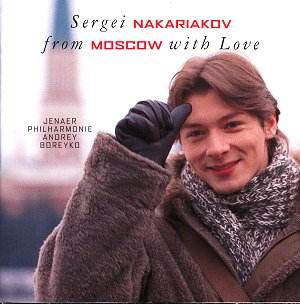It is inevitable, if somewhat unfair, that Sergei Nakariakov
is likely to be judged by comparison with that other great modern virtuoso
of the trumpet, Håkan Hardenberger. I say unfair because in reality
their careers have taken them in very different directions. Whilst Hardenberger
has built a whole new contemporary repertoire for the instrument Nakariakov
has, by and large, become more synonymous with the lighter and romantic
side of the instrument. One of his other recent releases on Teldec,
"No Limits", features transcriptions of works by Saint-Saëns,
Tchaikovsky, Bruch and Massenet. He makes considerable use of the flügel
horn as well as the trumpet.
Where Nakariakov really is unique is in his extraordinary
rise to fame following his "discovery" at the tender age of
twelve. Brass players are generally quite late to mature, yet Nakariakov
had a recording contract with Teldec at fifteen and is still only twenty
three.
This latest disc couples two original works for the
instrument with a transcription for flügel horn (by the soloistís
father) of Glièreís 1950 Horn Concerto that some may have
heard Nakariakov play at the 2001 Proms. It is the works by Arutiunian
and Vainberg that hold the greatest interest however, also drawing the
finest playing from the soloist.
Born in Yerevan, Armenia, Alexander Arutiunian
combined a career in conducting with composition, being principal conductor
of the Armenian Philharmonic Orchestra for thirty six years until his
retirement in 1990. His Trumpet Concerto is a relatively early
work, written after a two year period of study in Moscow, and plays
continuously whilst falling into three clearly defined sections. Not
surprisingly the influence of Shostakovich is evident very early in
the work (the orchestral introduction to the first principal trumpet
theme at around 1:23 speaks for itself) although the most lasting influence
is perhaps that of fellow Armenian Khachaturian. One senses that native
folk music is never far away and Arutiunian also favours a relaxed,
almost bluesy brand of melody reminiscent of a Shostakovich jazz suite
or film score. For all its influences however this is an attractive
and highly enjoyable work of infectious spirit. Nakariakov is more than
equal to the demands of the work although it is his legato playing in
the slower passages that really shines through.
If the Arutiunian brings out the best in Nakariakovís
lyrical playing it is the Vainberg that succeeds in exploiting
his technical facility to maximum effect. Subtitled Etudes, Episodes
and Fanfares respectively, each of the three movements explores
a contrasting aspect of the instrument and although the dominant force
is Shostakovich, Vainberg consciously weaves a multitude of quotes into
the work. This is notably the case in the final movement which is composed
entirely of cadenza-like references to famous trumpet solos from Mendelssohnís
Wedding March, Bizetís Carmen, Rimsky-Korsakovís The
Golden Cockerel and, although the booklet note does not mention
it, Stravinskyís Petrouchka. I am sure it is no coincidence that
the middle movement is also built on a triplet figure that immediately
calls to mind the opening of Mahlerís Fifth Symphony. Once again here
it is the lyrical element of the soloistís playing that holds the attention.
The opening movement is light-hearted in tone although there is nothing
light-hearted about the technical demands on the soloist, Nakariakov
overcoming them with deceptive, at times astonishing, ease.
As I previously hinted, the weak link here is the Glière.
It is no surprise that for a work composed in 1950 it is astonishingly
backward looking. It does not help however that there is little to distinguish
it melodically although Nakariakovís performance does succeed in warming
the heart somewhat. His mellifluous sound on the flügel horn is
delightful but for all of that I have to say that I would rather hear
it played on the instrument for which it was intended.
The Jenaer Philharmonie may be an unfamiliar name but
they give good support under Andrey Boreyko. With nicely balanced natural
sound to round things off this is a fine release which should give much
pleasure, extending beyond the realms of those with simply an interest
in the instrument itself.
Christopher Thomas


